40% of Canadians have experienced unsavoury telecom sales practices: CRTC

Canada’s telecom watchdog has released the results of a study undertaken by global market research firm Ipsos to gather public opinions regarding sales practices maintained by Canada’s telecommunications service providers.
The study comes roughly one week in advance of the Canadian Radio-television and Telecommunications Commission’s (CRTC) October 22nd, 2018 unsavoury telecom sales practices hearing.
According to the results of the CRTC’s October 16th, 2018 study, approximately 40 percent of respondents said that they have experienced aggressive or misleading sales practices, while approximately 60 percent of respondents said they’d experienced unsavoury sales practices within the past year.
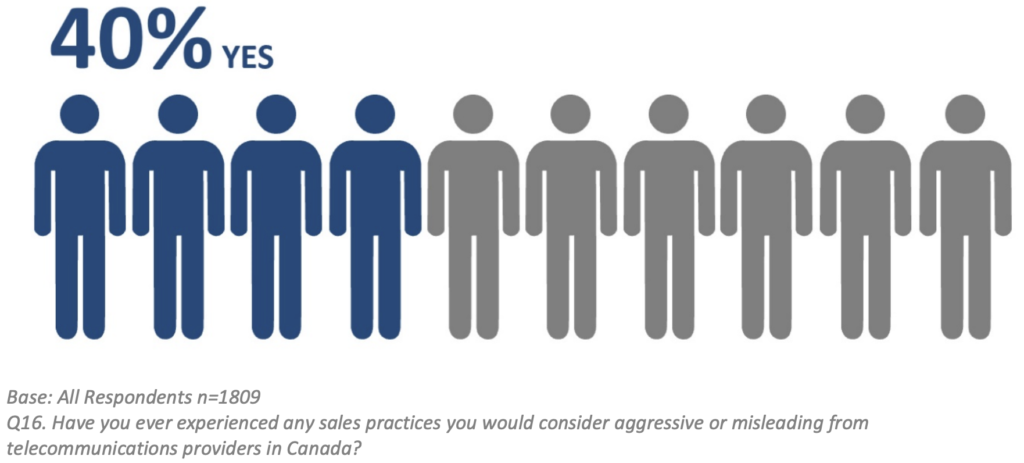
Approximately 58 percent of respondents said that they were extremely or very concerned about misleading sales practices, while 48 percent said they were concerned about aggressive sales practices.
Ipsos gathered 1,603 results from an online panel survey conducted between August 27, 2018 and September 9th, 2018, as well as 7,075 results from a public survey hosted on the CRTC’s website and a single paper-based survey available for request through the CRTC’s toll-free line.
Ipsos also conducted a number of qualitative studies across Canada, gathering information from seniors, individuals with accessibility needs (categorized as ‘Individuals with disabilities’), official language minority communities and third-language-speaking groups.
Of those surveyed, 55 percent of respondents said that they’ve experienced sales representatives attempting to push products or services that they were not interested in, while 35 percent of respondents said that technical support representatives attempted to sell products or services during a support interaction.
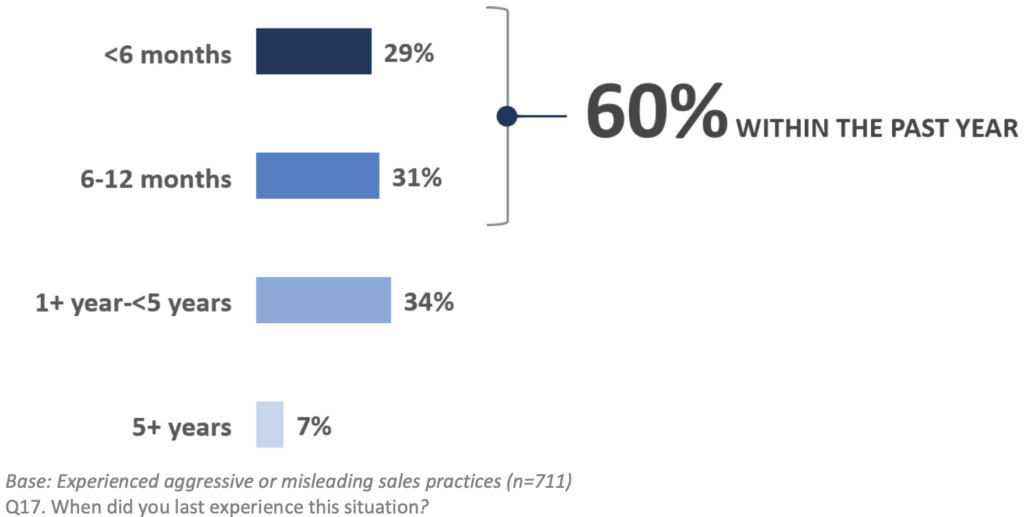
Additionally, 31 percent of respondents said that sales representatives provided false details about telecom products or services during an interaction, while 28 percent of respondents said that they received a rebate or discount offers where specific terms were not disclosed before a purchase had been made.
“When asked to explain their experiences, most comments could be attributed directly to either aggressive or misleading sales practice, while issues with door-to-door sales and poor customer service were also highlighted by some,” reads an excerpt from the report.
What’s interesting is that the CRTC’s study seems to suggest that concerns about telecom companies extend beyond fears of unsavoury sales practices.
Approximately 76 percent of respondents said that they believe that telecom companies “place the pursuit of profit above consumer protection,” while 77 percent said that they believe telecom companies “engage in aggressive or misleading sales practices to pressure more vulnerable people into accepting products or services they do not need.”
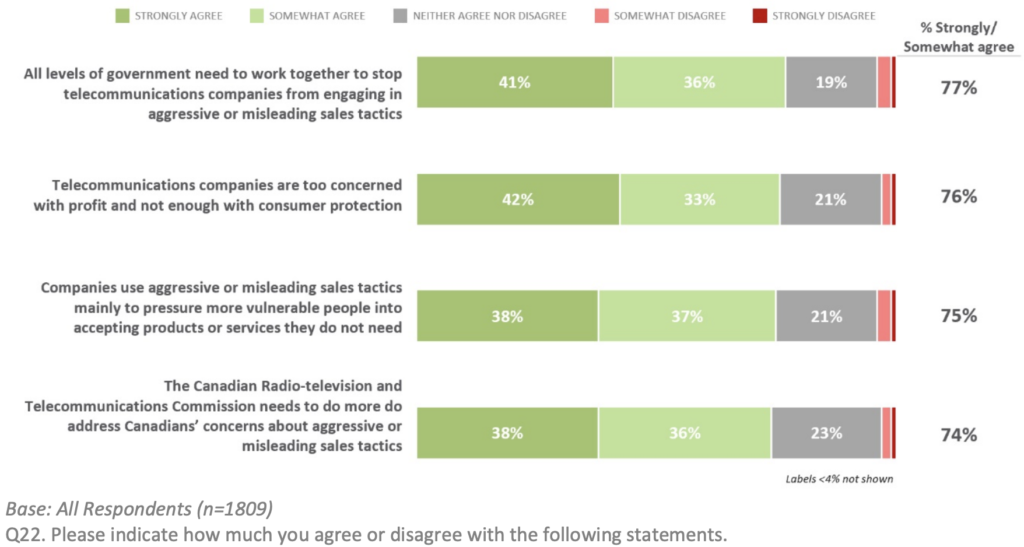
Sixty-eight percent of respondents said they believe switching to a provider that doesn’t engage in unsavoury telecom sales practices is the “best way to address aggressive or misleading sales practices.”
On the subject of other carriers, 70 percent of respondents said they were either extremely, very or somewhat concerned about the amount of competition in their specific sector or region.
Of those respondents who have been impacted by aggressive or misleading sales practices, 48 percent said they’d taken “significant steps” to deal with the problem beyond speaking with friends and family.
Only 39 percent of respondents complained to their provider, while only eight percent brought their concerns to the Commission for Complaints for Telecom-Television Services (CCTS).
On the subject of the CCTS, only 30 percent of respondents were aware of that the complaints Commission even existed.
Perhaps as a direct result of the fact that few consumers address their telecom concerns directly, 77 percent of respondents said they want government action “at all levels” to tackle the issue.
Seventy-four percent of respondents said they want the CRTC specifically to address these concerns.
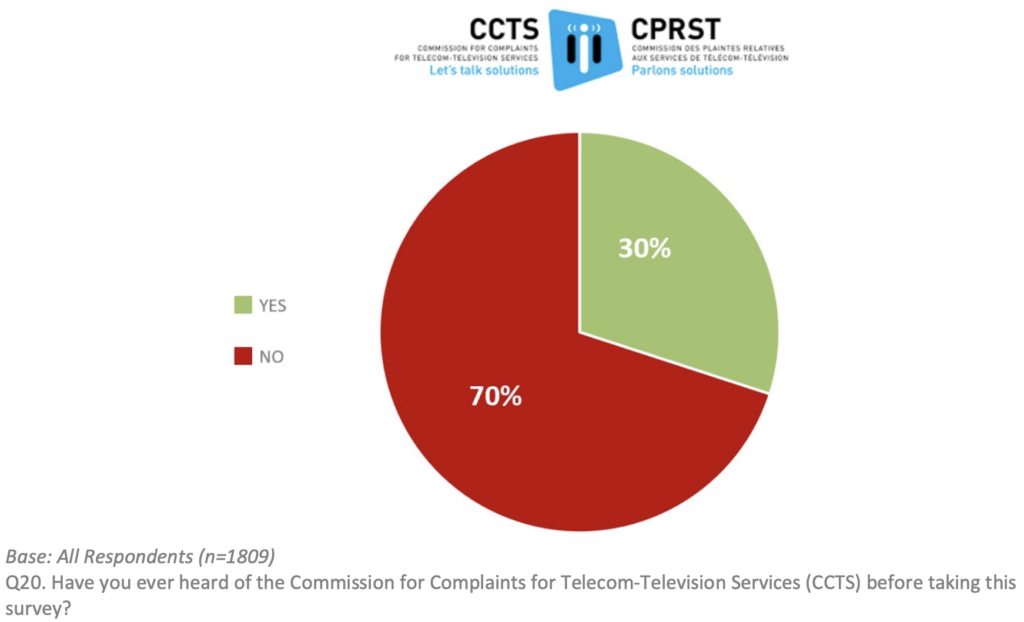
Additionally, 84 percent of respondents said they’d support a mandatory code of conduct, 83 percent said they’d support monetary penalties imposed on companies that engage in aggressive or misleading sales practices and 82 percent of respondents supported the public release of a report received by government regarding sales practices.
“Qualitative participants highlighted that these actions would be a means to empower consumers, enable more positive relationships with their telecommunications providers, and engage with the industry as informed consumers,” reads an excerpt from the study.
“They believe that a neutral third party would be best suited to oversee these actions.”
According to the CRTC’s study, Rogers and Bell/Aliant customers were more likely to report having experienced unsavoury telecom sales practices, “either overall or in regards to the specific types of practices presented.”
Videotron customers were more likely to report that they’ve experienced sales representatives attempting to sell products or services that they didn’t want.
Videotron customers were also more likely to report that their unsavoury experiences had taken place within the past year.
Demographic details
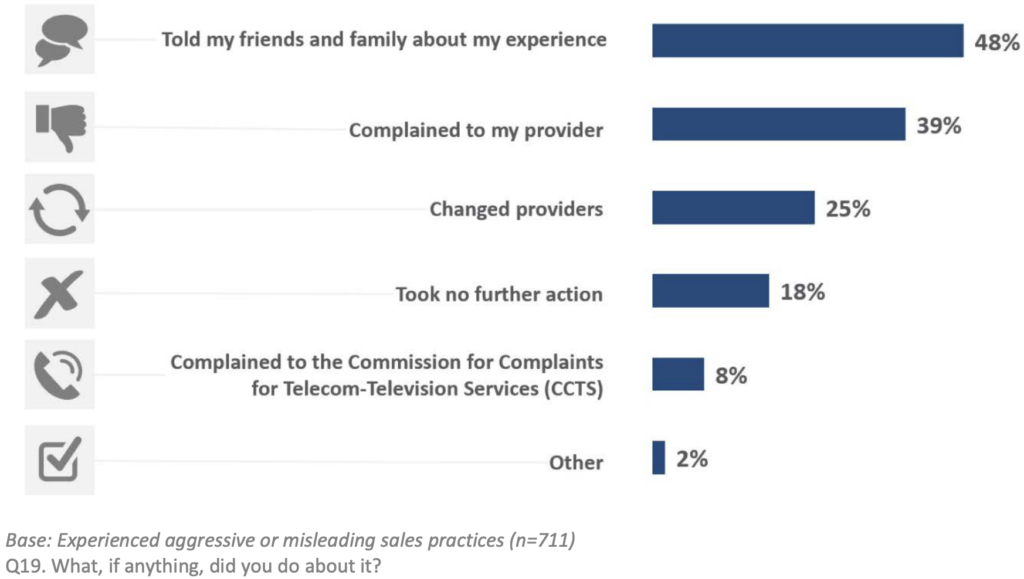
Ipsos’s qualitative research lent some insight into the experiences of different groups of Canadians.
Ontario residents were more likely to report experiencing unsavoury telecom sales practices, while Saskatchewan and Manitoba residents were the least likely to report that they’ve experienced unsavoury sales practices.
Rural Canadians were less likely to have personally experienced unsavoury sales practices when compared to their urban counterparts.
Understandably, rural Canadians were more likely than urban Canadians to express concerns about access to telecom services in rural areas.
In terms of age, unsavoury sales practices were more prevalent among individuals younger than 55-years-old, in particular with 18-to-34-year-olds.
More Indigenous respondents said that they’re aware of and have experienced unsavoury sales practices than non-Indigenous respondents.
Indigenous respondents were also less likely than non-Indigenous respondents to support potential remedies for the unsavoury sales practice issue.
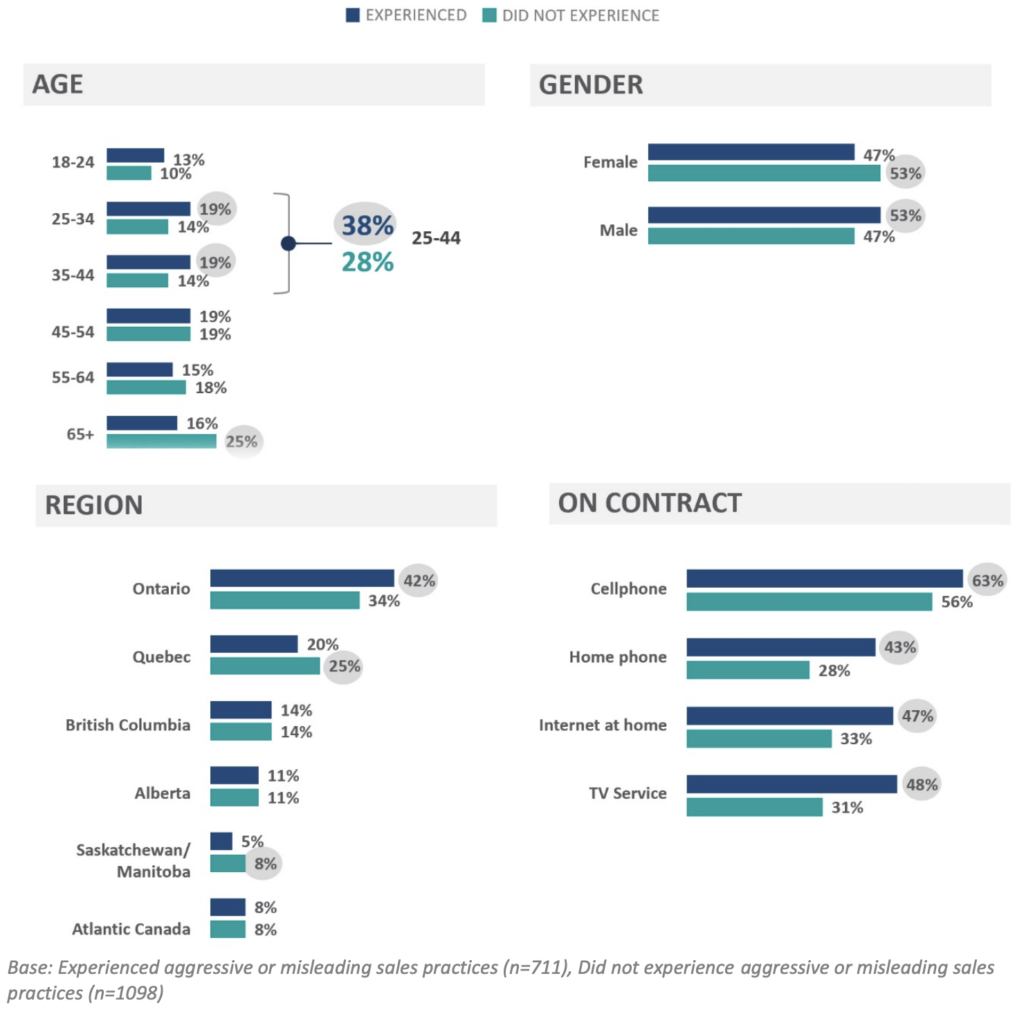
Additionally, Canadians who weren’t born in Canada were more tolerant of unsavoury sales practices than Canadians who were born in Canada.
In fact, Canadians who weren’t born in Canada were also less likely to feel that telecom companies care more about profit than people, expressing the belief that unsavoury sales practices are a “normal part of business and that concern about the tactics is exaggerated.”
That being said, “a strong majority” of Canadians not born in Canada were supportive of potential remedies, but still fewer than their counterparts who were born in Canada.
As for language differences, French language-speakers were less likely to express the belief that they’d personally experienced unsavoury sales practices.
Interestingly enough, English language-speakers were more likely to suggest that they’d told friends and family members about unsavoury sales practices.
Finally, individuals who privately submitted responses to the CRTC’s online survey were more likely to be aware of the unsavoury telecom sales issue. They were also more likely to have experienced it personally and were more concerns about unsavoury sales tactics as well.
Once the hearings have concluded, the CRTC will have until February 28th, 2019 to submit a report on unsavoury telecom sales practices in Canada.
Graphs sourced from the CRTC’s October 16th, 2018 report.
Source: CRTC
The post 40% of Canadians have experienced unsavoury telecom sales practices: CRTC appeared first on MobileSyrup.
from MobileSyrup https://ift.tt/2J6P4Nm
Labels: MobileSyrup
0 Comments:
Post a Comment
Subscribe to Post Comments [Atom]
<< Home